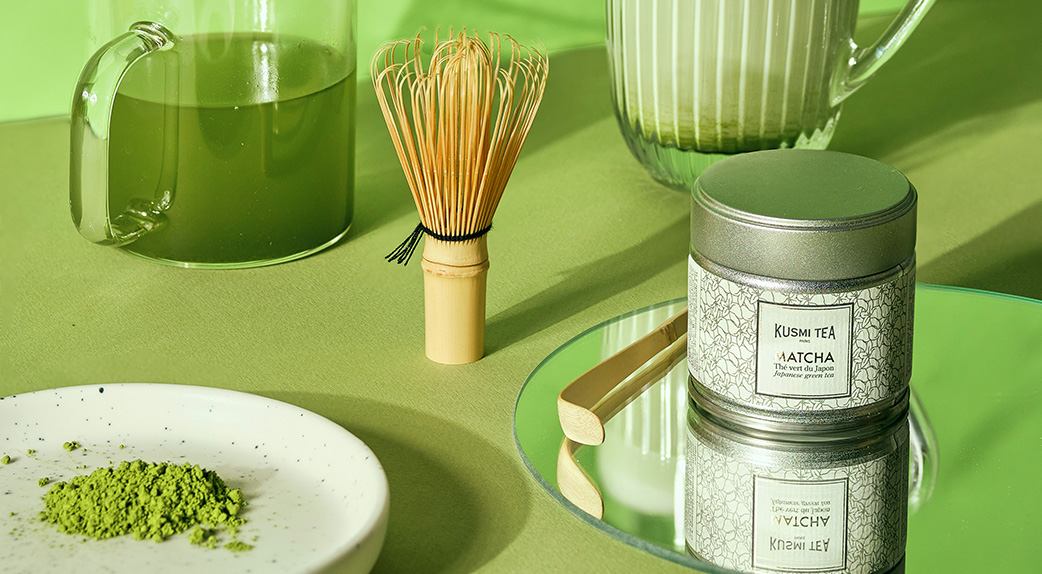Whether enjoyed neat, in a latte or in pastries, matcha tea, this green tea powder, has made a dramatic entrance on the French market. Its bitter and vegetal taste was quickly adopted. Mostly imported from Japan, it is however more expensive than other teas. We explain why and give you tips on how to pay the right price.

What is matcha tea?
A favourite tea of Buddhist monks, samurai and Japanese emperors, matcha is a unique green tea, as it does not come in the form of dried leaves, but as an emerald green powder. To obtain it, the tea leaves are crushed between two granite blocks. It is drunk by frothing it in a bowl with a bamboo whisk. Its great singularity lies in the fact that it is not only infused, but also entirely ingested during the tasting. A real treat!
Why is matcha tea more expensive than other teas?
Japanese green tea is on average more expensive than Chinese or Indian tea. There are several reasons for this, including the method of manufacture and the cost of labour, which is very high in Japan. Compared to conventional green tea, matcha tea has additional steps, such as shading the tea plants at the end of their growth or grinding the tea leaves (the stems and veins of the leaf are removed), which require skilled workers. Moreover, in Japan, the consumption of matcha has been elevated to the status of a true art, with the tea ceremony giving it its letters of nobility. This also affects its prestige and price. Finally, as domestic demand for matcha tea is strong in Japan, and agricultural land is scarce, exports remain limited. When they do occur, the cost of transport adds to the bill. All this makes Japanese matcha green tea particularly rare, prized and expensive. What's more, matcha tea has many health benefits!
How do you recognise a good matcha?
When ordering online or even in a shop, it is complicated to taste before buying. However, some of the information available is a good indication of the quality of the matcha tea, and will justify its price. A good matcha will have been grown in Japan, where the country ensures strict quality control. In other Asian countries (China, South Korea, Taiwan, Vietnam), which have started producing matcha tea, the quality will be less reliable. Indeed, without an internationally recognised name, they are free to call matcha any other powdered green tea... which can lead to some unpleasant surprises. If you can open the tin, the colour of the matcha tea is a good indicator of its quality. The brighter the emerald green, the fresher the matcha tea. On the other hand, a dull tea, even one with yellow and brown tones, will be a bad sign, as the stems and veins will have been crushed with the rest of the tea leaves.
What are the different levels of the matcha tea range?
Moving up the range, you will first find cooking matcha or culinary matcha. Made from the lowest leaves of the tea plant, or the third harvest of tea, these matcha are less noble and are intended for pastry recipes or for making mixed drinks, as the taste is more bitter. Secondly, the premium matcha grade will guarantee that only good quality tea leaves from the second harvest have been used. It is then a tasting tea, to be consumed pure, in order to feel its umami (a long-lasting and sweet aftertaste). Another name that sometimes appears is ceremonial matcha tea, which refers to a tea of even higher quality, from the first harvest, used during the tea ceremony. Other brands will then develop their own even more upmarket names, "prestige", "imperial" or "ultra premium", sometimes to justify high prices. It's all about marketing!
What is the price range of a good matcha?
For a kitchen matcha tea, you will find average prices in the range of 130 to 200 € per kilo (13 to 20 € per 100 grams). The price then rises to a crescendo depending on the quality range and whether or not organic farming is used. Thus, one can easily reach 300 to 500 € per kilo (30 to 50 € per 100 grams) for a good matcha. In Japan, the most expensive matcha, because it is awarded prizes, is sometimes sold for €2,000 per kilo!
Which matcha variety is the most expensive?
As explained above, ceremonial matcha tea is the most famous, as it contains the best of the tea leaves. It is logically the most expensive matcha. If you also choose an organically grown matcha tea, you will obtain an even higher quality product. But this organic, pesticide-free, environmentally friendly cultivation is subject to very strict international standards, which makes it more expensive.
Discover Kusmi Tea organic matcha tea!
At Kusmi Tea, all the teas and infusions offered by the company are organic, packaged in France and packaged in an eco-responsible manner. Our matcha tea, grown in Japan, is available in 30g boxes or 100g refills (at a price of €32.90 per 100g or €329 per kilo). The organic designation guarantees numerous quality controls during the production and manufacture of the tea. You can be sure that you are buying a pesticide-free tea, grown in an environmentally friendly way.
Our expert opinion on matcha tea
This green tea powder from Japan will delight the most refined palates. Matcha tea is the crème de la crème of teas. It has multiple benefits and is said to have antioxidant, diuretic, draining and stimulating properties. Interesting, isn't it?
Read also on the same theme :
Our matcha latte recipe with coconut
Our matcha latte recipe with chai
Is blue matcha really matcha tea?
Does matcha tea help you lose weight?

